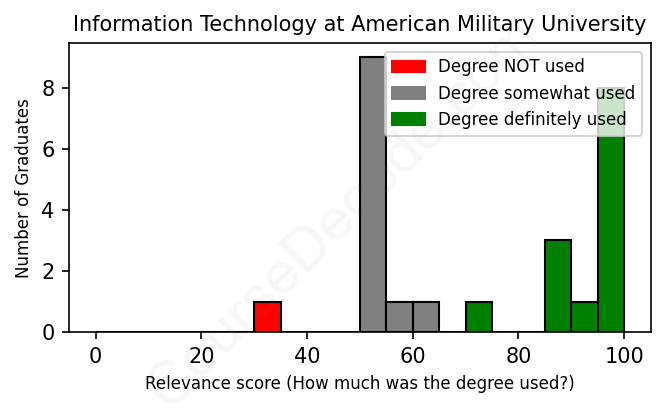
First, some facts. Of the Information Technology graduates from American Military University we've analyzed , here's how many have used (or NOT used) their degree in their career:

These are estimates based on AI analysis of 25 LinkedIn profiles (see below).
The verdict? Slightly above average. Overall, with an average relevance score of 72%, Information Technology graduates from American Military University have a slightly higher likelihood (+5%) of finding work in this field compared to the average graduate across all fields:
And for comparison, here's the chart for all profiles we've looked at across all degrees.
Also, after graduating, 44% of these graduates have pursued further education other than another Bachelor's degree (such as a Masters degree or other), compared to the average across all profiles of 35%. This suggests you may need more than just a Bachelors degree to be competitive as a Information Technology graduate.
See the details:
|
Relevance score: 87% We think this person has gone into a career highly relevant to their degree. We think this person has gone into a career highly relevant to their degree.
DEGREE INFOGraduated in 2014 from American Military University with a Bachelor's degree in Information Technology. Also pursued further education since (see below). JOB HISTORY SINCE GRADUATIONBroadcast Instructor at Defense Information School Lewis-Price & Associates, Inc. Aug 2014 - Nov 2018 Visual Information Communication Specialist  USAID Nov 2018 - Present Digital Communications Advisor  USAID Jan 2020 - Present Video Producer  U.S. Customs and Border Protection Nov 2021 - Present FURTHER DEGREES DONE SINCE GRADUATINGMaster's degreeAmerican Military University 2018 - 2019 ABOUTIf there is one thing that you must know about me is that I hunger for knowledge. I am always looking to learn and improve myself in both my personal and professional life. I believe I have a wealth of experience, but still always strive to learn more. I have served many roles both in and out of uniform to include; Photojournalist, public affairs practitioner, writer, videographer instructor. I am also very proficient with video editing and using Adobe Premiere, Photoshop, Illustrator and After Effects. I had the pleasure to serve as an instructor for almost 10 years. passing on all the skills and knowledge that I have learned. My degree in IT may seem odd, seeing as how it does not follow my current skill sets. My choice for an IT degree mirrors my second passion and a career path I may choose to follow in the future. |
The top 10 most common jobs done by the graduates we've analyzed (ranked most common to least) are:
From the analysis of LinkedIn profiles of graduates with a degree in Information Technology from American Military University, it's clear that many have found themselves in positions that are somewhat connected to their field of study. Common roles include Service Desk Manager, various IT management positions, and cybersecurity-related roles, especially with military backgrounds. For those who graduated between 2011 and 2023, roles like Cybersecurity Analysts, Systems Engineers, and IT Specialists dominate the picture, showcasing a blend of both technical and managerial responsibilities. Interestingly, many graduates gravitate towards roles that, while they have IT components, often focus heavily on customer service, project management, or operations rather than purely technical IT tasks.
Overall, the relevance of these jobs to their Information Technology degree spans a wide spectrum. Some positions, particularly in cybersecurity and IT management, are directly aligned with their educational training. However, many others, like customer service roles or project management in non-IT fields, don't necessarily capitalize on the core IT skills learned during their studies. Consequently, while a good number of graduates are successfully leveraging their IT education in relevant roles, there’s also a noticeable trend where graduates take on jobs that might not fully utilize their sophisticated IT knowledge and skills. It's a mixed bag, demonstrating that while an IT degree opens doors, the specific path taken can vary widely.
Here is a visual representation of the most common words in job titles for Information Technology graduates (this is across all Information Technology graduates we've analyzed, not just those who went to American Military University):

Based on the LinkedIn profiles analyzed, graduates from the Information Technology program at American Military University have tended to carve out solid career paths that align well with their degrees. Many of the early roles they step into after graduation—like IT Service Desk Manager or Cyberspace Analyst—suggest a clear entry into technical positions that leverage their academic training. This indicates that enough foundational knowledge and skills are provided during their studies to land relevant jobs right off the bat. As time goes on, many graduates gravitate toward managerial roles, with several advancing to positions like IT Manager, Digital Transformation Manager, and even Director of Operations within just a few years. This upward trajectory highlights their ability to adapt and grow within the tech sector.
Fast forward about five to ten years, and you see many of these graduates not just maintaining positions that are directly related to IT but also climbing the corporate ladder in significant ways, turning into leadership and oversight roles. While there are a few outliers who drift into unrelated fields—like real estate or education—most have successfully stayed within the tech realm, a great indicator of the program's effectiveness in preparing them for the job market. Overall, this pattern reflects positively on the career potential for graduates of American Military University’s Information Technology program, suggesting a strong industry relevance that many have leveraged into fulfilling careers.
The Bachelor’s degree in Information Technology at American Military University can be seen as moderately challenging, especially if you have a genuine interest in tech and problem-solving. It's not the easiest degree out there, but it's not the most difficult either. You’ll dive into subjects like networking, cybersecurity, and software development, which can be tough if you’re not really into those areas. However, the courses are designed to be manageable, and the online format is pretty flexible, making it easier to balance with other commitments. Overall, if you're willing to put in some effort and stay organized, you’ll likely find it to be a solid but doable journey!
Most commonly, in the LinkedIn profiles we've looked at, it takes people 5 years to finish a Bachelor degree in Information Technology.
Based on the job histories of these American Military University graduates, it looks like many of them are doing pretty well financially, especially considering the progression in their roles. A bunch of them have landed solid managerial and leadership positions in reputable companies and government agencies, which usually come with decent salaries and benefits. For example, the graduates from 2011 and 2012 have climbed the ladder at Progressive Insurance and Booz Allen Hamilton, respectively, indicating they're likely raking in good cash. On the flip side, some, like the recent graduates, might still be finding their footing, but they're starting in solid roles that can lead to better pay down the line. Overall, it seems like a large chunk of this group is on a good path to make some decent money as their careers advance!
Here is a visual representation of the most common words seen in the "about" section of LinkedIn profiles who have a Bachelor degree in Information Technology (this is across all Information Technology graduates we've analyzed, not just those who went to American Military University). This may or may not be useful:

Here are all colleges offering a Bachelor degree in Information Technology (ordered by the average relevance score of their Information Technology graduates, best to worst) where we have analyzed at least 10 of their graduates: